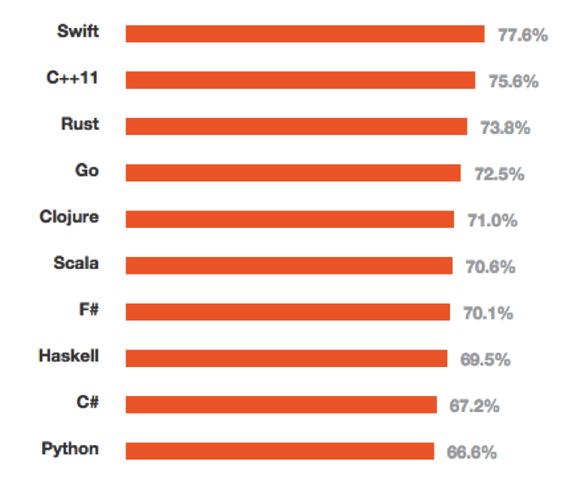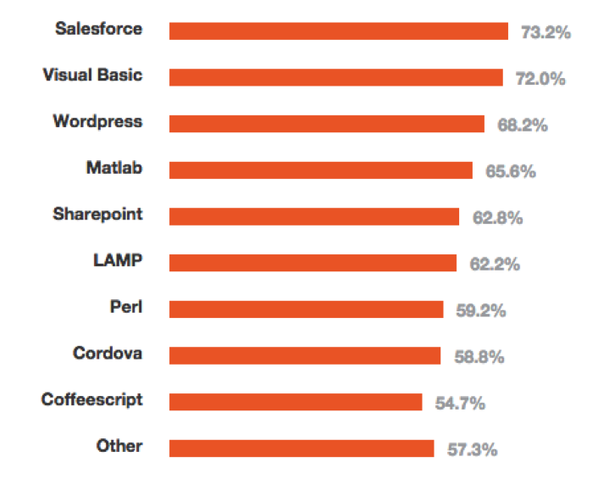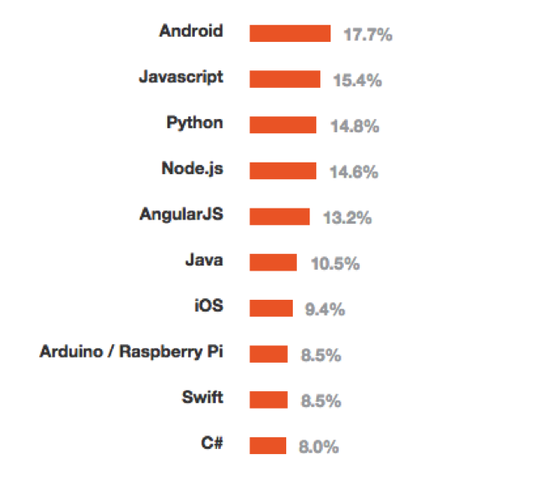Developers hate the stock enterprise tools you keep forcing them to use

It's no secret that developers increasingly rule the enterprise roost. What is perhaps more surprising, though it shouldn't be, is that they hate the stock enterprise tools you keep forcing them to use.
As a new Stack Overflow survey reveals, they want more Go and Scala, and a heck of a lot less Matlab, Salesforce, and Visual Basic.
For enterprises that are determined to remain relevant, the best way may be simply to get out of the way and let your developers build.
The most loved, dreaded, and wanted programming technologies
When Stack Overflow asked its massive community which programming technologies they're using and plan to keep working with, a shakeout of "Loved," "Dreaded," and "Most Wanted" technologies emerge.
These are the programming languages that developers love (Figure A):

Programming languages that developers love.
These are the programming languages that developers dread and hope to not have to use again (Figure B):
Figure B

The programming languages developers dread.
Lastly, for those that aren't currently working with a given technology, but wish that they were, here are the programming languages that developers most want to work with (Figure C):
Figure C

The programming languages developers most want to work with.
At the risk of oversimplifying the results, developers want to work with technologies that allow them to build the future rather than mire them in the past.
Apple's Swift, for example, gives developers the keys to the mobile kingdom. Google's AngularJS, for its part, lets developers build rich web applications, whether for mobile or desktop, that bleed the lines between native and web.
Coding for Salesforce or Sharepoint, however, tends to result in less interesting, less ambitious projects that may be important to the enterprise but aren't engaging to the developer. Oh, and to add insult to injury, these programming approaches also pay less than their more loved peers.
Keep your developers satisfied
All of this suggests that enterprises may want to reconsider their standard toolsets for development. Given the importance of developers to enterprise innovation, it's becoming mandatory that enterprises give them the tools they want, not force them into rigid IT policies that curb their freedom and enthusiasm.
It's not a matter of simply adding more options, either.
Developers are losing patience with the so-called "polyglot future," wherein they're forced to juggle an ever-expanding mishmash of programming technologies. As Tim Bray notes:
"There is a real cost to this continuous widening of the base of knowledge a developer has to have to remain relevant. One of today's buzzwords is 'full-stack developer,' which sounds good, but there's a little guy in the back of my mind screaming, 'You mean I have to know Gradle internals and ListView failure modes and NSManagedObject quirks and Ember containers and the Actor model and what interface{} means in Go and Docker support variation in Cloud providers?' Color me suspicious."
These developers are unlikely to give up their programming "loves." Rather, they're going to find a way around the "most dreaded" technologies.
With Stack Overflow's survey revealing that 70% of developers spend two or more hours per week programming either as a hobby or working on open-source software, and an average of seven hours each week coding on the side, enterprise developers routinely get a taste for what programming looks like beyond their corporate firewall. They're simply not going to remain satisfied being forced to use yesterday's technology to fix yesterday's business problems.
So, for enterprise managers that want to keep their jobs and build the future, here's some advice: get out of the way and let your developers use what they want to build what your enterprise needs.


